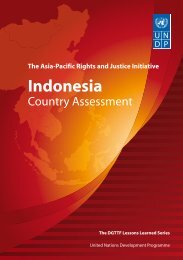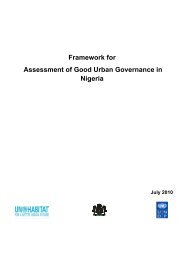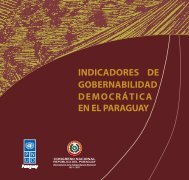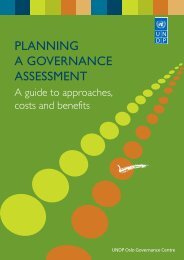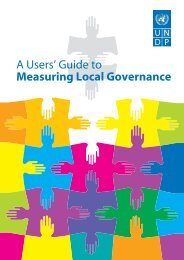English - UNDP
English - UNDP
English - UNDP
You also want an ePaper? Increase the reach of your titles
YUMPU automatically turns print PDFs into web optimized ePapers that Google loves.
Local Governance and Decentralization<br />
development councils and supported with small grants of<br />
US$3,000 24 .<br />
Efficiency<br />
The project was implemented under the <strong>UNDP</strong> Direct Execution<br />
Modality, whereby <strong>UNDP</strong> Tajikistan took overall responsibility<br />
for its general and financial management.<br />
Implementation was efficient, with timely outputs and fund<br />
utilization. The implementation mechanism developed for the<br />
Communities Programme was used, and that further increased<br />
efficiency in terms of using available resources in the office.<br />
Innovation<br />
The DGTTF funds have enabled <strong>UNDP</strong> Tajikistan to strengthen<br />
local governance by creating partnerships between the public,<br />
private, and civil society sectors at the jamoat and district levels.<br />
The project addressed gaps in the capacity of district councils<br />
to comprehensively implement new functions arising from<br />
the reformed legal framework. It has also enabled <strong>UNDP</strong> to<br />
introduce innovative tools, such as citizen report card surveys<br />
and citizens’ charters, to improve public service delivery.<br />
The project applied the following innovative methodology<br />
and tools:<br />
a The project pursued a systematic approach to training,<br />
encompassing the following key elements: situation analysis<br />
and training needs assessment (focused on analysing<br />
the existing problem and identification of the training<br />
needs); design of training (including model and methodology,<br />
learning objectives, and the content of training<br />
based on the results of the analysis); implementation of<br />
training (including mentoring and on the job-training<br />
to ensure that the training is relevant and practical), and<br />
evaluation of training.<br />
a Citizen Report Cards were developed for the first time<br />
to reflect public perceptions of the Poverty Reduction<br />
Strategy through transparent and systematic analysis of<br />
public services. The mechanism was based on a survey<br />
of the actual users of public services: the feedback of the<br />
households on their experiences with public services was<br />
collected, analysed and disseminated.<br />
a Citizen charters were designed to complement the citizens’<br />
report card system. They list services that local governments<br />
provide, along with information on fees and<br />
service charges, including the time required to complete<br />
a formal administrative procedure or provide requested<br />
service.<br />
Catalytic effect<br />
The Government of Tajikistan took firm ownership of the project<br />
and its immediate results. Activities initially implemented in<br />
five pilot districts were expanded to a further six districts. The<br />
Strategic Research Centre led implementation of the citizens’<br />
report cards and citizen charters, while the Institute for Civil<br />
Service Training directed the capacity development programme.<br />
These activities were supported financially by <strong>UNDP</strong>, DFID, ADB,<br />
CIDA, and GTZ, through the multi-donor funded Communities<br />
Programme 2007-2009. The total project budget for this<br />
period was approximately US$22 million, while this particular<br />
component was supported with around US$3.5 million 25 .<br />
The District Development Committees established with support<br />
from the DGTTF project introduced development plans in the<br />
five districts. The follow up project, Building National Capacities<br />
for Implementation of Poverty Reduction Strategies (US$130,000),<br />
helped communities to identify development priorities through<br />
the interaction of public, private, and civil society sectors<br />
represented in the committees. This approach was expanded<br />
further in a large scale Rural Growth Programme (funded by<br />
DFID, <strong>UNDP</strong>, and GTZ). A total of US$5 million is allocated for<br />
the 2010 – 2012 Good Governance component, whose key<br />
focus is development planning for 14 districts and 65 jamoats.<br />
Sustainability<br />
The review of each project’s sustainability suggests a very high<br />
level of sustainability for elements of the project.<br />
Training for the Institute for Civil Servants adopted the<br />
programme used to train civil servants in the pilot districts. In the<br />
preceding three years, nearly four thousand civil servants from<br />
the central and local governments, as well as local authorities,<br />
were trained. Then, in 2009, the Institute for Civil Servants<br />
launched a Master’s Degree Programme in Public Administration,<br />
where 61 civil servants are now continuing their education 26 .<br />
The Institute for Civil Servants also took responsibility for<br />
implementing the Citizens Charters, which are now funded<br />
from national resources.<br />
Meanwhile, the President of Tajikistan’s Strategic Research Centre<br />
took over responsibility for the implementation of the Citizens<br />
24<br />
The approved projects were: the construction of an IP telephone station in<br />
Tavildara, the construction of a women’s hospital in Kolkhozobod, the rehabilition<br />
of a water supply system in Isfara, and the reconstruction of a women’s<br />
clinic in Vahdat.<br />
25<br />
<strong>UNDP</strong> (2009) : Outcomes Evaluation Report: Communities Program in Tajikistan,<br />
prepared by Ton de Klerk, Elena Krylova-Mueller.<br />
26<br />
The official presentation of the Institute for Improving the Qualifications of<br />
Civil Servants of the Republic of Tajikistan: www.dtixd.tj Last access: 26 April<br />
2011.<br />
16




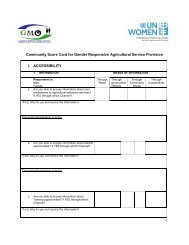
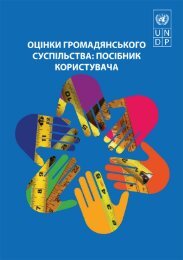
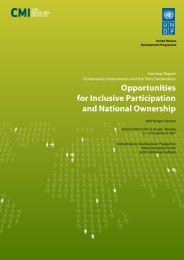
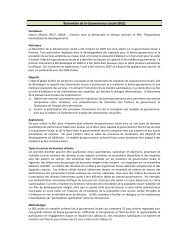
![GuÃa del Usuario ] - Governance Assessment Portal](https://img.yumpu.com/44740603/1/190x253/gua-a-del-usuario-governance-assessment-portal.jpg?quality=85)
